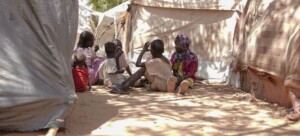‘Outlook on cholera worsens with rainy season’
The cholera epidemic is expected to last this rainy season, which may exacerbate the situation in the eight states most affected. The rate of infections decreased in Khartoum and White Nile states.
The cholera epidemic is expected to last this rainy season, which may exacerbate the situation in the eight states most affected. The rate of infections decreased in Khartoum and White Nile states.
The Central Committee of Sudanese Doctors reported on Thursday that the epidemic is spreading during the rainy season, amid the deterioration of health conditions in hospitals and lack of measures to prevent the spread of the disease.
Starting mid-June, torrential rains swept through camps, leaving the streets flooded and numbers of families homeless.
Rates of cholera infection steadily increased in North and East Darfur, Sennar, North and South Kordofan, El Gedaref, River Nile, and El Gezira. Meanwhile infections have significantly decreased in Khartoum and the White Nile states, sources reported to Radio Dabanga.
On Wednesday night, an anti-cholera campaign volunteer reported the death of a person in Kabkabiya in North Darfur. “The hospital recorded seven new infection cases, bringing the total number of hospitalised cases at the isolation ward to 56 patients,” she told this station.
A health worker reported the next day that there were six new cases of cholera in El Gadaref, and here the total number of hospitalised cases in the isolation ward is 36. In addition 22 cases were recorded in Gireigana and Um Sineibra, in the central locality of El Gedaref. Salemeen area of Gala El Nahal locality recorded 50 new cases.
In two weeks’ time Salemeen witnessed 120 new cholera cases, the Central Committee of Sudanese Doctors announced in a new report on Thursday. 90 people with cholera were recorded in Basunda locality.
Khazan Jadeed in East Darfur has recorded more than 124 cases of cholera, where eight people have died.
Darfur
The isolation ward in Zamzam camp for displaced people near El Fasher in North Darfur recorded three new cholera patients, a camp elder told Radio Dabanga, bringing the number of hospitalised cases to eight people.
“The ward suffers from a lack of lighting,” the sheikh said, claiming that the management of the health centre disposes of waste out in the open – “in a place adjacent to the health centre which allows for the spread the disease”.
More than hundred people with cholera, 124, have been recorded at Khazan Jadeed in Shearia locality, East Darfur. Eight people have died. Four people were infected with cholera this week, local omda Mohamed Jaafar told Radio Dabanga.
Sennar
The Central Committee also reported that 21 people died of cholera in El Dindir locality last week.
‘Six villages in the locality have recorded high rates of cholera infections, because of the disruption of water pumps and drinking water from the seasonal river El Dindir, which began to run days ago.’
The report pointed to one death and seven new infection cases at El Hashim Hospital in El Dindir.
A medical source reported to Radio Dabanga from Sinja Hospital in Sennar that it has received twelve new cholera cases, including two critical cases, on Wednesday and Thursday. “The cases in the hospital came from El Dindir and Sinja localities,” he said.
Eastern Sudan
One person died in El Zeidab, River Nile state, and nine people were infected with cholera, the committee reported. In El Gezira’s Rufaa, a health centre currently treats 27 people with cholera.
A health worker in Kassala state in the New Halfa Hospital told this station that five patients with the symptoms of cholera are being treated. “Samples are at the laboratory to confirm the disease.”
Students have to carry their own water and food to schools in Delling
North and South Kordofan
The hospital in El Obeid, the capital of North Kordofan, recorded 31 new cases, the committee reported. Meanwhile the locality health department in South Kordofan’s Delling prohibited the sale of food and ice cream in basic and secondary schools in the first week of the new school year.
The department wants to prevent the spread of cholera among students, a decision that requires students to carry water and food from their homes, a witness in Delling said.
Follow #CholeraInSudan, #الكوليرا_السودان for ongoing coverage by Radio Dabanga











 and then
and then